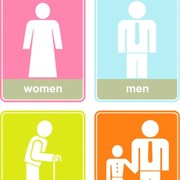 Photo: Getty Images
Photo: Getty Images
Diarrhea does not discriminate. Anyone at any age can be affected by diarrhea.
According to the National Institute of Diabetes and Digestive and Kidney Diseases (NIDDK), National Institutes of Health (NIH) website, U.S. adults average one bout of acute diarrhea each year, and young children have an average of two episodes of acute diarrhea each year.
The NIH also stated, "the most common causes of diarrhea include bacterial, viral, and parasitic infections; functional bowel disorders; intestinal diseases; food intolerances and sensitivities; and reactions to medicines."
Symptoms of diarrhea according to the University of Maryland Medical Center include:
• Stomach cramping
• Frequent and loose stools
• Abdominal pain
• General sick feeling
• Thirst
• Weight loss
• Fever
• Chills
The NIH website also added the following important medical information regarding diarrhea:
• Diarrhea is a common problem that usually goes away on its own.
• Diarrhea is loose, watery stools.
• Having diarrhea means passing loose stools three or more times a day.
• Diarrhea can cause dehydration.
• Diarrhea is particularly dangerous in children, older adults, and people with weakened immune systems.
• Children with diarrhea should be given oral rehydration solutions to replace lost fluids and electrolytes.
• Children with any of the following symptoms should see a health care provider: signs of dehydration, diarrhea for more than 24 hours, a fever of 102 degrees or higher, stools containing blood or pus, or stools that are black and tarry.
• Adults with any of the following symptoms should see a health care provider: signs of dehydration, diarrhea for more than 2 days, severe pain in the abdomen or rectum, a fever of 102 degrees or higher, stools containing blood or pus, or stools that are black and tarry.
• People can take steps to prevent two types of diarrhea—rotavirus diarrhea and traveler’s diarrhea.
• Treatment involves replacing lost fluids and electrolytes. Depending on the cause of the problem, medication may also be needed to stop the diarrhea or treat an infection.
Many medical experts recommend allowing the diarrhea to run its course. It is not recommended to take any over-the-counter remedies because your body is eliminating the infection.
Foods that may make your diarrhea worse are sweets, greasy foods, caffeine and high fiber foods. The NIH stated "yogurt may help people recover from diarrhea more quickly." Some medical experts also recommend the B.R.A.T. diet for diarrhea. The B.R.A.T. diet consists of bananas, rice, applesauce and toast.
The University of Maryland Medical Center recommends contacting your doctor if you are dehydrated and if your diarrhea has not stopped after three to five days.
Sources:
Diarrhea - National Digestive Diseases Information Clearinghouse. Home -National Digestive Diseases Information Clearinghouse. Retrieved October 24, 2011, from http://digestive.niddk.nih.gov/ddiseases/pubs/diarrhea
Diarrhea – Univeristy of Maryland Medical Center. Retrieved October 25, 2011 from http://www.umm.edu/altmed/articles/diarrhea-000050.htm
BRAT Diet: Recovering From an Upset Stomach. The American Academy of Family Physicians. Retrieved October 25, 2011 from
http://familydoctor.org/familydoctor/en/prevention-wellness/food-nutrition/weight-loss/brat-diet-recovering-from-an-upset-stomach.html
Reviewed October 25, 2011
by Michele Blacksberg RN
Edited by Jody Smith





Add a CommentComments
There are no comments yet. Be the first one and get the conversation started!